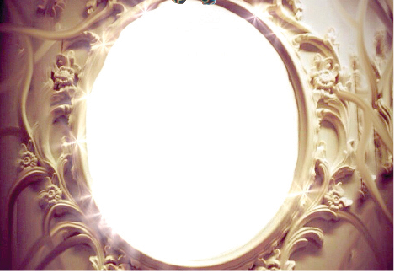Mirror on the wall, but none for babies

Mirrors have always possessed certain spooky views. Magic mirrors in literature abound, from the ancient story of Narcissus, who fell in love with and pined for his own reflection in a pool of water, to present-day urban legends about summoning Bloody Mary by saying her name three times into a mirror.
Snow White’s queen had a magic mirror and Alice travelled through the looking glass to the other side. In ancient Chinese mythology, there’s the story of the Mirror Kingdom, where creatures are bound by magic to sleep, but will one day rise again to do battle with our world.
Mirrors also have a strong connection to the concept of the soul, which results in a wealth of superstition. For instance, one of the reasons that breaking a mirror causes seven years of bad omen is that the soul, thought to regenerate every seven years, shatters with the broken mirror. Vampires, who have no souls, are thus invisible to mirrors.
Trapping souls
It’s also dangerous for babies, whose souls are undeveloped, to look into mirrors before their first birthday. In some cultures it is believed that newborns shouldn’t see themselves in mirrors as it can capture and trap souls that can’t be freed again.
Rahab Oura shares how she was advised by her mother to ensure that her child never comes close to a mirror.
“One of the reasons I was given for this is that babies, especially those below one year should not come anywhere close to a mirror as this could trap their souls or even make them sick,” she says.
Even with no supporting evidence, some cultures believe that when infants look at themselves on a mirror, something bad will most likely happen to them.
Dr James Kariuki, a lecturer of sociology and social work at the University of Nairobi says some cultures have it that if a baby looks at themselves in the mirror before their first birthday, they may become sick or develop a fever. “There is also a belief that if a baby looks into the mirror, it may lead to delayed speech and stammering,” he explains.
He adds that to some, once a baby sees their own reflection before they are able to recognise face and understand the concept of showing emotions, it may cause confusion or frighten them. Others believe a baby can have toothache, crooked teeth or tummy aches just by looking at their reflection on the mirror.
However, he says it’s important to keep in mind that these beliefs vary across cultures and there is no scientific evidence to support them.
Other than mirrors, the human behaviour don says that some cultures believe that it wasn’t relevant to have pre-baby events such as baby showers, baby naming and gender reveals. “This was believed to invite evil for prematurely celebrating and rubbing your happiness on someone trying to conceive,” he says.
He adds that some countries such as Spain, believe that jumping over babies saves them of sin!
Helpful for babies, though
Surprisingly, according to Arizona’s Infant and Toddler Development Guidelines, babies can benefit from seeing their own reflection as it helps them develop a sense of self-awareness and recognition.
It further helps in developing various skills such as eye-hand coordination, language, and listening skills as well as imitation.
On her part, Esther Mbau, a counselling psychologist at Kipepeo Wellness Centre says that mirrors can be a great tool for infants to explore their own reflection, and also help with their development in a number of ways. “Babies become self-aware of themselves. They tend to be fascinated with their own reflections and by observing themselves in mirrors, they build an understanding of their own being. This helps enhance their self-awareness and allow them to become more familiar with their body movements and facial expressions,” she says.
She adds that mirrors can also help in the social and emotional development of children in that, when babies look at themselves in mirrors, they are able to see different facial expressions and also imitate them.
By gazing at themselves and their loved ones in a mirror, babies can learn to identify familiar faces, track movements and even develop their tiny muscles as they reach and roll toward their reflection.
“As babies start exploring their own reflection, they learn to recognise patterns and shapes, and even develop an understanding of cause and effect. All of these skills come together to help them develop their cognitive abilities,” she explains.
Further, Mbau explains that when babies spend time in front of mirrors, they often make sounds and gestures as they observe their reflection, which can help them with their language development as they start to make connections between words and actions.If you talk to your baby in front of the mirror, you’ll also help boost her language skills.
“Overall, mirrors can be a great tool for babies to explore and learn more about themselves, their environment, and others around them,” she says.












